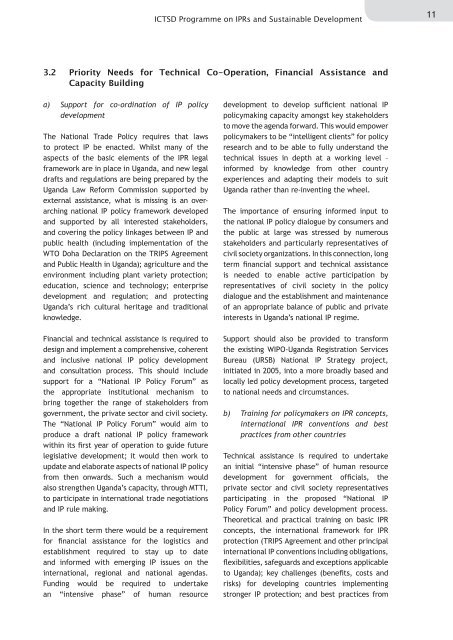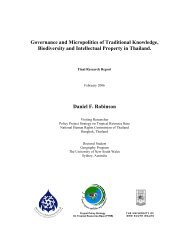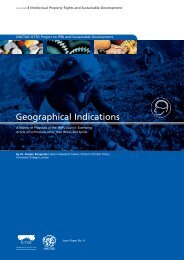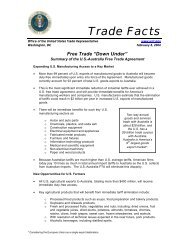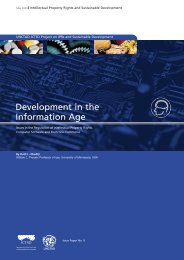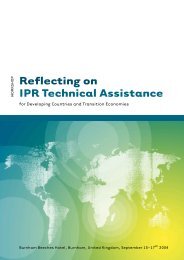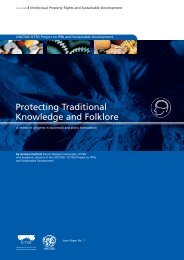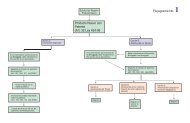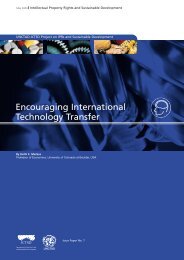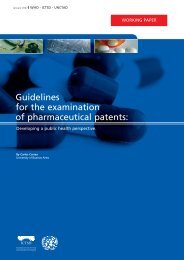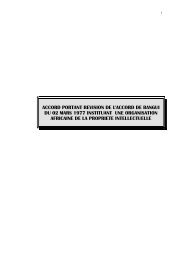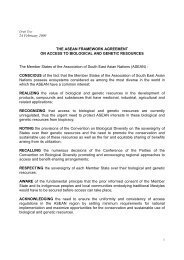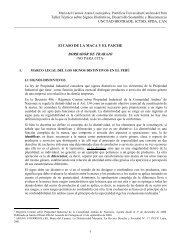Final Report of Uganda Intellectual Property ... - IPRsonline.org
Final Report of Uganda Intellectual Property ... - IPRsonline.org
Final Report of Uganda Intellectual Property ... - IPRsonline.org
Create successful ePaper yourself
Turn your PDF publications into a flip-book with our unique Google optimized e-Paper software.
ICTSD Programme on IPRs and Sustainable Development<br />
11<br />
3.2 Priority Needs for Technical Co-Operation, Financial Assistance and<br />
Capacity Building<br />
a) Support for co-ordination <strong>of</strong> IP policy<br />
development<br />
The National Trade Policy requires that laws<br />
to protect IP be enacted. Whilst many <strong>of</strong> the<br />
aspects <strong>of</strong> the basic elements <strong>of</strong> the IPR legal<br />
framework are in place in <strong>Uganda</strong>, and new legal<br />
drafts and regulations are being prepared by the<br />
<strong>Uganda</strong> Law Reform Commission supported by<br />
external assistance, what is missing is an overarching<br />
national IP policy framework developed<br />
and supported by all interested stakeholders,<br />
and covering the policy linkages between IP and<br />
public health (including implementation <strong>of</strong> the<br />
WTO Doha Declaration on the TRIPS Agreement<br />
and Public Health in <strong>Uganda</strong>); agriculture and the<br />
environment including plant variety protection;<br />
education, science and technology; enterprise<br />
development and regulation; and protecting<br />
<strong>Uganda</strong>’s rich cultural heritage and traditional<br />
knowledge.<br />
Financial and technical assistance is required to<br />
design and implement a comprehensive, coherent<br />
and inclusive national IP policy development<br />
and consultation process. This should include<br />
support for a “National IP Policy Forum” as<br />
the appropriate institutional mechanism to<br />
bring together the range <strong>of</strong> stakeholders from<br />
government, the private sector and civil society.<br />
The “National IP Policy Forum” would aim to<br />
produce a draft national IP policy framework<br />
within its first year <strong>of</strong> operation to guide future<br />
legislative development; it would then work to<br />
update and elaborate aspects <strong>of</strong> national IP policy<br />
from then onwards. Such a mechanism would<br />
also strengthen <strong>Uganda</strong>’s capacity, through MTTI,<br />
to participate in international trade negotiations<br />
and IP rule making.<br />
In the short term there would be a requirement<br />
for financial assistance for the logistics and<br />
establishment required to stay up to date<br />
and informed with emerging IP issues on the<br />
international, regional and national agendas.<br />
Funding would be required to undertake<br />
an “intensive phase” <strong>of</strong> human resource<br />
development to develop sufficient national IP<br />
policymaking capacity amongst key stakeholders<br />
to move the agenda forward. This would empower<br />
policymakers to be “intelligent clients” for policy<br />
research and to be able to fully understand the<br />
technical issues in depth at a working level –<br />
informed by knowledge from other country<br />
experiences and adapting their models to suit<br />
<strong>Uganda</strong> rather than re-inventing the wheel.<br />
The importance <strong>of</strong> ensuring informed input to<br />
the national IP policy dialogue by consumers and<br />
the public at large was stressed by numerous<br />
stakeholders and particularly representatives <strong>of</strong><br />
civil society <strong>org</strong>anizations. In this connection, long<br />
term financial support and technical assistance<br />
is needed to enable active participation by<br />
representatives <strong>of</strong> civil society in the policy<br />
dialogue and the establishment and maintenance<br />
<strong>of</strong> an appropriate balance <strong>of</strong> public and private<br />
interests in <strong>Uganda</strong>’s national IP regime.<br />
Support should also be provided to transform<br />
the existing WIPO-<strong>Uganda</strong> Registration Services<br />
Bureau (URSB) National IP Strategy project,<br />
initiated in 2005, into a more broadly based and<br />
locally led policy development process, targeted<br />
to national needs and circumstances.<br />
b) Training for policymakers on IPR concepts,<br />
international IPR conventions and best<br />
practices from other countries<br />
Technical assistance is required to undertake<br />
an initial “intensive phase” <strong>of</strong> human resource<br />
development for government <strong>of</strong>ficials, the<br />
private sector and civil society representatives<br />
participating in the proposed “National IP<br />
Policy Forum” and policy development process.<br />
Theoretical and practical training on basic IPR<br />
concepts, the international framework for IPR<br />
protection (TRIPS Agreement and other principal<br />
international IP conventions including obligations,<br />
flexibilities, safeguards and exceptions applicable<br />
to <strong>Uganda</strong>); key challenges (benefits, costs and<br />
risks) for developing countries implementing<br />
stronger IP protection; and best practices from


